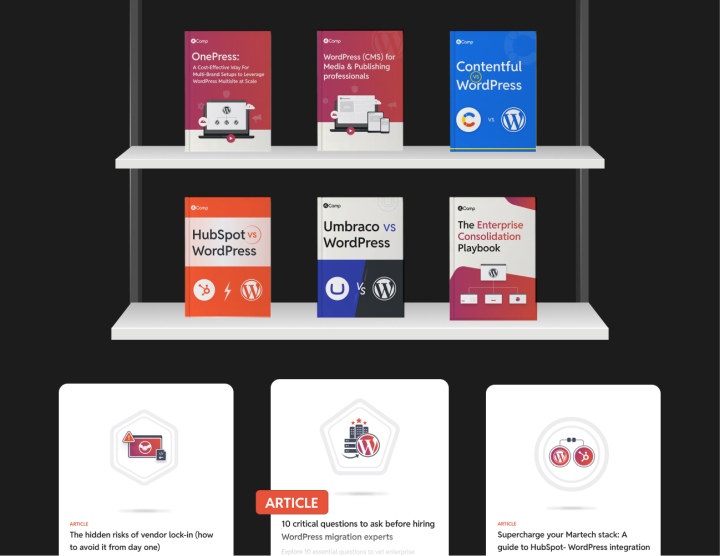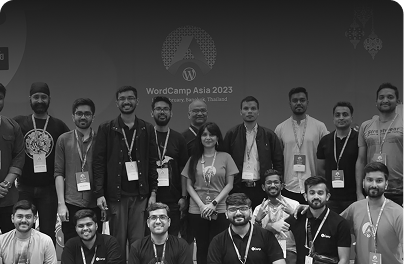How enterprise WordPress hosting redefines support
In enterprise environments, support isn’t just about “fixing things when they break.” It’s about preventing outages, optimizing performance, and aligning technology decisions with business priorities. In fact, at the enterprise scale, every minute of downtime can mean lost revenue, missed opportunities, or damaged trust.
Generic support simply doesn’t hold up in the conditions enterprises operate (traffic surges, regulatory audits, global rollouts, for example).
That’s why support in enterprise WordPress hosting is fundamentally different from ticket queues or call centers. It’s built for mission-critical environments, with proactive monitoring, senior-level expertise, and ongoing strategic input baked into the service model. The gap between standard hosting support and enterprise support isn’t just about availability… it’s about depth, accountability, and foresight. Providers like WordPress VIP hosting and other managed WordPress hosting for enterprise platforms reshape the support model in several ways.
Differentiating support tiers: Standard vs. Enterprise support
24/7 proactive monitoring
Enterprises rarely have linear traffic. Monitoring must account for global audiences, round-the-clock access, and attack attempts that happen while teams sleep. Enterprise hosting provides continuous monitoring of CPU, memory, query load, login endpoints, and suspicious traffic. In many cases, anomalies are contained before they escalate into outages, giving enterprises resilience without expanding their in-house operations teams.
24/7/365 access to senior WordPress engineers
In standard hosting models, the first line of defense is often a Level 1 support desk (generalists), escalating only when issues prove complex.
With enterprise WordPress hosting, on the other hand, escalation paths are engineered to minimize response times. Critical issues trigger contractual SLAs with guaranteed response times, routing directly to senior engineers with WordPress and infrastructure expertise. You’re speaking directly to someone who understands WordPress at scale.
This access reduces the resolution time, turning hours of escalation into minutes of decisive action.
WordPress-specific expertise (beyond monitoring)
Generic hosting teams can keep a server online. Enterprise hosting teams guide plugin vetting, theme architecture, and multisite governance. They perform code-level performance audits and flag security gaps specific to WordPress (e.g., poorly maintained plugins, XML-RPC vulnerabilities, non-scalable caching strategies). This guidance ties infrastructure health directly to application performance.
Dedicated Account and Technical Account Managers (TAMs)
Support isn’t just about solving today’s issue but also about anticipating tomorrow’s challenges. Enterprise WordPress hosting includes dedicated account managers and technical account managers (TAMs) who know your business context, site architecture, and compliance requirements.
These roles bridge the gap between support and strategy. TAMs flag risks early, provide tailored recommendations, and ensure your hosting environment evolves with your digital roadmap.
As a result, the relationship moves from reactive troubleshooting to an ongoing partnership, where support staff operate as an extension of your own team.
Guaranteed SLAs with measurable response times
Availability alone doesn’t define support, accountability does. Standard providers may advertise “best effort” response times, but enterprises need contractual guarantees.
Enterprise WordPress hosting platforms back their support with service level agreements (SLAs) that define measurable response times for different issue severities. For high-priority incidents, SLAs enforce immediate response, escalation paths, and clear accountability. This gives enterprises confidence not only in the technology but in the people and processes supporting it.
Ongoing strategic consultation and optimization reviews
The realities of the enterprise scale (growing traffic, evolving compliance standards, and shifting business priorities) demand a hosting partner that stays engaged long after go-live.
Here, support evolves from reactive helpdesk to strategic advisory. In line with this, enterprise WordPress hosting providers deliver scheduled performance reviews, roadmap consultations, and optimization sessions, ensuring that WordPress aligns with enterprise goals. These reviews include:
- Performance optimization: analyzing traffic patterns, database queries, caching strategies, and CDN utilization to recommend continuous improvements.
- Security posture reviews: assessing patch status, plugin updates, and access controls to ensure the platform remains secure/compliant.
- Roadmap alignment: advising on upcoming campaigns, product launches, or multisite expansions to ensure infrastructure is ready for surges and architectural complexity.
- Innovation guidance: introducing new capabilities, from headless WordPress setups to DevOps workflow enhancements, so enterprises can modernize without adding risk.
- Cost-efficiency and resource planning: reviewing infrastructure usage, scalability patterns, and support costs to ensure the enterprise isn’t over-provisioning resources or underestimating future capacity needs. These reviews align hosting investments with business value, helping justify spend while avoiding waste.
This ongoing engagement transforms support into a strategic function.
Enterprises are not left to make critical hosting decisions in isolation; instead, they benefit from a partner that understands WordPress at scale and proactively brings forward best practices, industry insights, and infrastructure innovations.
In practice, these optimization reviews help enterprises stay strong online. Rather than waiting for issues to surface, they create a cycle of continuous improvement where WordPress hosting evolves in step with enterprise growth.
Onboarding and migration services
For enterprises, moving to a new hosting platform can be risky: downtime, broken integrations, or compliance gaps. That’s why enterprise WordPress hosting providers invest heavily in structured onboarding and migration services, designed to make transitions safe.
Structured onboarding programs
Enterprise onboarding begins well before migration. Providers run discovery consultations to understand business goals, compliance requirements, and current architecture. Technical account managers work with internal teams to map environments, integrations, and workflows. The goal isn’t just to set up the hosting, but to align the platform with enterprise realities from day one.
White-glove migration process and validation testing
Migration is treated as a managed project and not as a task handed off to scripts. Enterprise WordPress hosting providers offer white-glove migration services, including rehearsal cutovers, dependency mapping, and multi-phase validation testing. Every plugin, API integration, SSO flow, and CDN edge configuration is checked before moving over to production, reducing risk and ensuring business continuity.
Pre-launch code reviews and performance audits
Before an enterprise goes live, providers conduct deep reviews of code and configuration. WordPress experts evaluate custom themes, plugins, caching layers, and database queries for scalability and security. Performance audits benchmark expected traffic loads, ensuring campaigns or launches won’t trigger unexpected bottlenecks. These reviews are an essential guardrail that standard hosting isn’t designed to provide.
Post-migration training and knowledge transfer
Support doesn’t end at the migration. Enterprise WordPress hosting providers often run post-migration training sessions for developer teams, content managers, and IT stakeholders. They also have development partners to help with this. Such training ensures teams understand new workflows, tools (such as staging environments, Git integrations, or CI/CD pipelines), and governance practices. By closing this knowledge gap, enterprises are empowered to fully leverage the platform from day one.
Evaluating enterprise WordPress hosting support: From helpdesk to partnership
The difference between standard hosting and enterprise WordPress hosting isn’t just in infrastructure but in the support model itself. With managed WordPress hosting for enterprise, support evolves from ticket queues and best-effort responses into a proactive, strategic partnership.
Enterprises gain more than uptime guarantees. They gain 24/7 access to senior WordPress engineers, dedicated account management, and contractual SLAs that enforce accountability. They benefit from structured onboarding, white-glove migrations, pre-launch audits, and ongoing optimization reviews that ensure WordPress scales in step with the business.
At scale, support becomes a growth enabler: preventing downtime, accelerating delivery, and aligning hosting strategy with enterprise priorities. In this model, hosting isn’t just infrastructure, it’s a long-term partner in an enterprise’s digital success.







